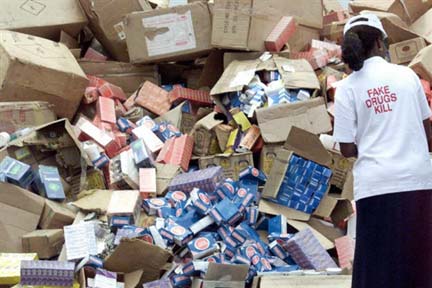Until recently we had our way of hunting down fake medicines in Nigeria. The DG of NAFDAC would team up with a squad of “mobile” police men and go to the nearest market, round up a group of dealers, sieze their apparently fake medicines, go to a large open space, invite all the gentlemen of the press and burn them in a large burn fire. Until today all sorts of medicines are available in any mixture you want throughout the major markets in eastern Nigeria – fact! (I know this statement will not be popular).
The World Health Organization believes that 25% of the medicines sold around the developing world are inauthentic copies containing little or no active ingredients.
Now to Ghana…
Ghana has become not only the choice destination of businesses leaving Nigeria and the choice holiday destination of an emerging middle class, but now they seem to be at the centre cutting edge of innovative solutions for the continent. One has caught our eyes….
Can you imagine a lady walking to a patent medicine dealer and then sending of a quick SMS/text-message via her cellphone to confirm that the prescription drug she intends to purchase is safe for her child and not a fake?
mPedigree, a Ghanaian start-up, is working to make this a reality throughout Africa. It is led by Bright Simons, a dynamic, young social entrepreneur from Ghana, who is on a mission to find partners and investors and spread the word about mPedigree. If mPedigree is able to forge the public-private partnerships necessary between governments, the pharmaceutical industries, and telecom giants, this technology may well become a revolutionary force in bringing access to safe drugs to people across the developing world.
How it works
Pharmaceutical companies emboss special codes on drug packaging that are recorded in mPedigree’s database. When consumers purchase a drug, they can scratch off a panel to reveal the unique code and send it via text message to a universal four-digit number. The request is routed to mPedigree’s servers, located in New Hampshire. After sending the code, consumers get a response by text, usually within five seconds, indicating whether the product is genuine.
To read more…..
– in Business week
– in the Economist
…etc etc….
…and Bright is now a TED Fellow.
Pls NAFDAC save us any more pictures of burning drugs in our newspapers. This is after all 2010…
Never doubt that a small group of thoughtful committed people can change the world; indeed it is the only thing that ever has…Margaret Mead





NAFDAC is already using SMS to protect consumers from fake medication. This started over 4 months ago! If you’re in Nigeria, send an SMS with the message “123456789” to 38353 on any of the GSM networks to get a response on your phone. The text message is free and the service is offered by Sproxil, a Boston-based technology company. If you walk into any pharmacy in Nigeria and ask for Glucophage 500mg, you will be able to authenticate it on the spot.
Excellent BUT who knows about this.Whose responsibility is it to inform the Nigerian people of this service. Not NAFDAC? Not a word on their website! I have just made 10 phone calls to colleagues in the health professions…none of them has heard about this service..then how then will the people know. Is there any operational data available? Any evaluation of use and benefit? If the people do not know of this service then of what benefit is it? BUT all the same ..great that it exists.
And why does it take more than 5 minutes to get a response on this number @sproxil? Is this the usual “it works everywhere but Nigeria” syndrome? We cant even copy well anymore?
While we are still on the NAFDAC issue, does anyone know why their official website is riddled with Google adverts? These ads make the website look like a joke.
Chikwe, if you know anyone in NAFDAC, please suggest to them to take down those ads in the interest of professionalism.
@ Dan Ladi – thanks for comments. NAFDAC have to be aware of the state of their website! Shame really…